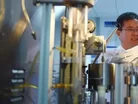Sinopec begins work on million-tonne carbon capture project

Sinopec, a Chinese oil and gas enterprise based in Beijing, has today announced that it has begun work on building a project with the aim to capture up to 1mn tonnes of carbon dioxide from industrial processes.
Known as the megaton carbon capture, utilisation, and storage (CCUS) project, it aims to create a template for the large-scale development of carbon capture throughout China. Once complete, it will be the country’s largest whole-industrial-chain carbon capture project.
Talking about the project, Zhang Yuzhuo, Chairman of Sinopec, said: “According to the International Energy Agency, CCUS will contribute about 14% of carbon dioxide emissions reduction by 2050. Sinopec will research and establish an R&D centre to advance a series of core technologies”.
How does the megaton carbon capture, utilisation, and storage (CCUS) project work?
According to Sinopec, the CCUS project will capture carbon dioxide released from industrial processes and purify it. Then, the carbon is liquified and injected into the Shengli Oilfield, which is located near the second largest river in China, the Yellow River Delta. This process improves the liquidity of the field’s crude oil, according to Sinopec.
A video explaining more about the CCUS project can be found below.
Expected to be operational by the end of this year, the project has been described by Sinopec as a “milestone in the development of the carbon capture industry”, and a contributor to China’s 2030 plan to reach peak carbon emissions by 2030 and complete carbon neutrality by 2060.
“Studies have shown that CCUS will neutralize China's 1bn tonnes of carbon emissions in the future, effectively promoting the purification of fossil energy, the scaled development of clean energy, and low-carbon production”, the company said in a statement.
Sinopec aims to build a similar project to CCUS within the next five years, although details on it are yet to be released. The company believes the environmental effects of the CCUS project will be the same as planting 9mn trees and shutting down 600,000 fossil fuel cars.


